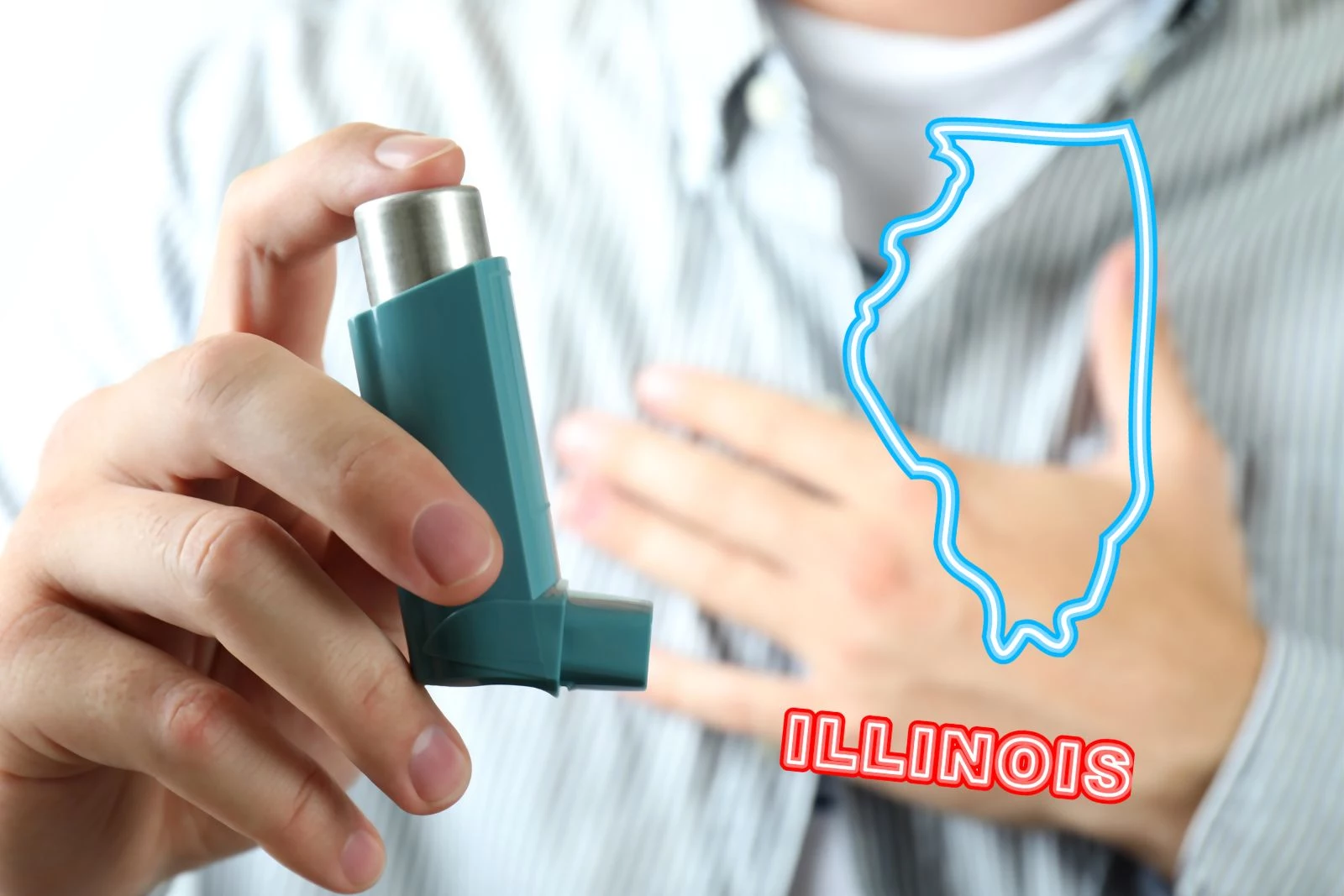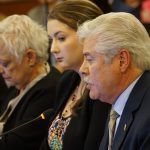
CHICAGO — Block Club Chicago Senior Editor Kelly Bauer will be honored with the Donald R. Grubb Distinguished Alumnus Award by Northern Illinois University’s Department of Communications Friday.
As a reporter, Bauer helped launch Block Club, a nonprofit newsroom, in 2018. In 2020, she broke the Loretto Hospital vaccine scandal wide open, uncovering one of the biggest stories of the pandemic. The investigative stories led to an FBI probe, the ousting of top officials and the city taking over vaccines at the hospital.
For her Loretto reporting, in 2021, Bauer was named Chicago Journalist of the Year by the Chicago Journalists Association and Chicago Magazine’s “Best Watchdog,” esteemed media columnist Robert Feder called her “local journalism’s breakout star of the year,” and Block Club launched its investigative fund in her honor.
In 2022, she was honored with Driehaus Foundation Awards for Investigative Reporting’s Reader’s Choice Award, Park Center for Independent Media’s Izzy Award, LION Publishers’ Outstanding Coverage Award, and Chicago Journalist Association’s Sarah Brown Boyden Award for Investigations, among other honors.
Behind the scenes, Bauer answered hundreds of questions on Block Club’s free COVID-19 hotline at the height of the pandemic. Bauer went on to serve as Breaking News Editor at Block Club before being named Senior Editor, a role where she currently manages a team of reporters and projects.
The vote to honor Bauer was unanimous, NIU instructor Jason Akst said.
“Block Club readers know Kelly because of the outsized role she plays in bringing Chicagoans the news,” Block Club Executive Editor and co-founder Stephanie Lulay said. “We know her as relentlessly talented, fearless and ethical without ego, a prolific journalist whose heart is truly in serving our readers. We could not be more proud of her accomplishments and the shine she brings on our newsroom and to her alma mater.”
Bauer, who attended NIU from 2011-2015 and graduated with a Bachelor of Arts degree in journalism, served as editor in chief of the Northern Star for three years.
Bauer will be honored at NIU’s 77th annual journalism awards banquet Friday night at the university.
Support Local News!
Subscribe to Block Club Chicago, an independent, 501(c)(3), journalist-run newsroom. Every dime we make funds reporting from Chicago’s neighborhoods. Already subscribe? Click here to gift a subscription, or you can support Block Club with a tax-deductible donation.
Listen to the Block Club Chicago podcast:

Legislation filed by State Representative Norine Hammond (R-Macomb) to assist local road districts with funding challenges was unanimously passed by the Illinois House on Wednesday.
House Bill 5190 provides that the allocation to road districts shall be made in the same manner and be subject to the same conditions and qualifications as are provided by current law concerning the allocation to road districts of the amount allotted from the Motor Fuel Tax Fund for apportionment to counties for the use of road districts. It further provides that any funds allocated to a county that are not obligated within 48 months shall be considered lapsed funds and reappropriated in the same fund. The lapsed funds shall be used to provide additional monetary assistance to townships and road districts that have insufficient funding for the construction of bridges that are 20 feet or more in length.
Hammond’s legislation is an initiative of the Illinois Association of County Engineers.
“My legislation addresses the funding challenges that local road districts have had concerning maintaining roads and bridges by updating the current funding formula for local road districts,” said Rep. Hammond. “I’m grateful to the Illinois Association of County Engineers for working with me on this issue and I thank my House colleagues for their unanimous support.”
House Bill 5190 passed the Illinois House on a vote of 114-0-0 and now goes to the Illinois Senate for further consideration.
***Courtesy of Representative Norine Hammond***
The post Legislation to Assist Local Road Districts with Funding Challenges Passes House appeared first on Prairie Communications, LLC.

 image/jpeg 625055ec5befe.image.jpg?resize=300,230
image/jpeg 625055ec5befe.image.jpg?resize=300,230 image/jpeg 662196bac657b.image.jpg?resize=300,225
image/jpeg 662196bac657b.image.jpg?resize=300,225
By DILPREET RAJU
Capitol News Illinois
draju@capitolnewsillinois.com
Housing advocates are renewing a push to fund a $20 million state affordable housing tax credit in the upcoming state budget.
Supporters of the “Build Illinois Homes Tax Credit Act,” modeled after a federal tax credit program, claimed it would result in over 1,000 affordable housing units being built over its first six years. The push for the measure, contained in House Bill 4909 and Senate Bill 3233, comes one year after a similar to appropriate $35 million in tax credits failed to advance.
Its supporters said the money would replace federal pandemic-era funding that went to the Illinois Housing Development Authority over the last three years but has since run out.
Allison Clements, the executive director of the Illinois Housing Council, a housing association representing almost 300 businesses and nonprofits, said is designed to provide “immediate attention” to the state’s “housing crisis.”
Read more: Advocates push for tax credit aimed at increasing affordable housing
That sentiment was echoed by HB 4909’s chief sponsor Rep. Dagmara Avelar, D-Bolingbrook, who said her constituents tell her they are worried about being priced out of their homes or apartments. The program would help build up to 1,150 affordable homes and apartments within six years, Avelar said.
Illinois has a shortage of close to 300,000 affordable rental homes, according to a report published last month by Housing Action Illinois, an affordable housing advocacy group.
Clements said the tax credit “is not going to meet the entire needs of the state” but is needed to maintain what the IHDA has been receiving.
“Affordable housing is not a Democrat issue, it’s not a Republican issue, it’s an issue about our constituents,” Avelar said. “Investors will only receive the state tax credit after construction is complete and qualified tenants move in with affordable rents.”
Corporate ownership has affected rents, which is why affordable units are needed more than ever, she added.
“We have also seen a very troubling – and skyrocketing – rate of corporate landlords who are buying homes, apartments and who are pretty much increasing (the cost of) rental units to the point where people are being priced out,” Avelar said.
Sen. Robert Peters, D-Chicago, who is the chief sponsor of SB 3233, said the tax credit is just one way of adding more affordable housing in the state.
“We have huge needs (for affordable housing), you’ve seen this talked about all the time. We talked about a ballot initiative in Chicago, well, this is another way we can actually deal with housing,” he said.
This year’s push also has backing from the Illinois Manufacturers Association and the Laborers’ International Union of North America Midwest Region, two influential groups within the Statehouse.
Overdose prevention strategies
Harm reduction advocates and multiple House members called for more state funding towards evidence-based solutions “beyond naloxone and safe supplies.”
Among those solutions are overdose prevention sites – a designated brick-and-mortar location where people with substance use disorders can receive clean supplies and use drugs safely in the presence of public health workers who ensure people who potentially overdose do not die.
Rep. La Shawn Ford, D-Chicago, described rising overdose numbers as an “international problem” impacting all kinds of communities. Ford is the chief sponsor of House Bill 2, which provides the framework for an overdose prevention site in Chicago and has languished in the Rules Committee for almost one year.
Aisha Betancourt-Esquivel became an advocate for harm reduction in 2019 after her daughter, BreAna Betancourt-Esquivel, died of combined drug toxicity at 25 years old.
“We all have loved ones that are worthy of all possible avenues to recovery,” Betancourt-Esquivel said.
“I stand here to ask for your strong consideration and support of an overdose prevention site because an overdose prevention site could have helped my daughter,” she added. “Yes, it’s a wild idea but guess what? The drugs will still be here, we just want to keep these people alive.”
Rep. Lindsey LaPointe, D-Chicago, said she represents “hundreds of people who want to stop using drugs, but they live in fear and stigma.”
“With the exception of naloxone and safe supplies, evidence-based harm reduction interventions have been left out of our behavioral health and public health funding streams in Illinois,” said LaPointe, who is a former social worker and current chair of the House Mental Health and Addiction Committee.
Rep. Camille Lilly, D-Chicago, said she used her naloxone training two separate times to assist men who overdosed in her district. Rep. Will Guzzardi, D-Chicago, said he had a “dear friend” die from an overdose before he became a legislator.
“I share your passion for this issue, I share the frustration I’m sure you all experience at times,” Guzzardi said. “Why can’t we just get it done? I’m sure people in this room are feeling that way today.”
Capitol News Illinois is a nonprofit, nonpartisan news service covering state government. It is distributed to hundreds of newspapers, radio and TV stations statewide. It is funded primarily by the Illinois Press Foundation and the Robert R. McCormick Foundation, along with major contributions from the Illinois Broadcasters Foundation and Southern Illinois Editorial Association.

By ANDREW ADAMS
Capitol News Illinois
aadams@capitolnewsillinois.com
BOLINGBROOK – A manufacturer in the southwest suburbs of Chicago received $2.6 million from electric utility Commonwealth Edison this week as part of a state program for generating its own electricity using solar panels and storing it in one of the largest batteries in the country.
But even as solar projects have boomed in Illinois in recent years, the head of the state agency responsible for approving renewable projects said changes to state law may be necessary to phase out fossil fuels by 2050.
G&W Electric Co., which installed a “microgrid” at its Bolingbrook facility, captures energy from the sun using eight football fields’ worth of solar panels and stores the electricity generated in a vanadium redox battery built inside 20 shipping containers.
Company representatives hailed the state-of-the-art battery storage as a step toward resilience to storms and regular disruptions to the electric grid. The solar panels deliver electricity to the factory and keep the batteries charged, with the batteries designed to power the facility during an outage. The company’s chairman and owner, John Mueller, said that project has saved $1.8 million in lost production time due to “microinterruptions” in the factory’s electricity supply since it came online late last year.
The project received a record-high rebate from ComEd as part of the Distributed Generation Rebate program, which was created in 2017 by the Future Energy Jobs Act and expanded in 2021 with the Climate and Equitable Jobs Act. ComEd has given out $130 million in rebates since the program was created.
The 2-megawatt vanadium redox battery is pictured at G&W Electric, one of the largest in the country. (Capitol News Illinois photo by Andrew Adams)
Gov. JB Pritzker, speaking at G&W Electric on Monday, said that projects like this are a way that companies can “join the fight against climate change” and that the project was “setting a standard for solar investing.”
This and other state programs have contributed to an explosion in the number of solar projects in the past 2 ½ years. Pritzker said on Monday that since the passage of CEJA, the state has doubled the percentage of its electricity production that comes from renewables.
“I’m very pleased about the direction that we’re going,” Pritzker said. “I obviously would like it to accelerate more.”
The federal Energy Information Administration, which calculates renewable generation independently using a different methodology from the state, reported that in December 2023, the state produced about 15.2 percent of its energy from renewables, behind the national average of 20.9 percent.
The state’s current goal is to have 40 percent of its retail electricity sales come from renewable energy by 2030.
The Illinois Power Agency is responsible for managing electricity procurement for the state and manages Illinois’ renewable portfolio by approving renewable energy projects’ contracts.
Brian Granahan, the acting director of the Illinois Power Agency, said the current pace for solar developments is doing its part to help the state meet its renewable energy goals, but other renewables are falling short. State law sets a goal of solar making up 55 percent of the state’s renewable energy portfolio, with the other 45 percent coming from wind and hydroelectric projects.
“We’ve made so much progress since CEJA passed,” Granahan told Capitol News Illinois.
But despite ambitious goals for purchasing energy from wind projects, Granahan said few projects have been approved, calling the situation “very challenging.”
Across the four “procurement events” the IPA has held since CEJA went into effect, the agency has approved three wind projects compared to the 34 solar projects. An analysis prepared by outside consultants for IPA in May 2023 revealed that two of those events resulted in no new contracts for wind developments at all.
The flywheel in G&W Electric’s microgrid, shown in its white enclosure, rotates fast enough that it can power the company’s manufacturing facility for 62 seconds, long enough to switch to battery power in the case of a power outage. (Capitol News Illinois photo by Andrew Adams)
This is partly due to developers being forced to navigate a complex system to select sites for wind developments – something the state took control of early last year. Wind development is also facing a downturn in interest nationally, according to Granahan.
To address this, the legislature may need to revise the state’s energy policy yet again to allow for more flexibility within its goals, according to Granahan.
“If there isn’t the same interest on behalf of companies developing wind projects, then does it make sense to have these goals by technology hard coded in statute?” Granahan said.
While no specific legislation is pending that would change the requirements for the state’s renewable portfolio, a spokesperson for the governor’s office said Pritzker “strongly supports solutions that help Illinois achieve its clean energy goals” and that he would review any legislation passed by the General Assembly.
The IPA also faces another issue that affects both wind and solar developers: its budget for buying renewable energy.
Last spring, the agency published an analysis of the budget it uses to purchase renewable energy credits on behalf of utilities. The analysis projected several scenarios based on variable energy prices.
While the agency is working on an updated version of that report, it highlighted what Granahan called “massive uncertainty” that comes with long-term planning involving energy prices. That uncertainty can result in developers being hesitant to propose new projects because they are uncertain that money will be available to purchase renewable energy in the future.
“We’re saying to ourselves, ‘Okay, we should be good doing all this activity through 2025, 2026,’” Granahan said. “And then we’ll know more based on what happens in those procurements.”
Capitol News Illinois is a nonprofit, nonpartisan news service covering state government. It is distributed to hundreds of print and broadcast outlets statewide. It is funded primarily by the Illinois Press Foundation and the Robert R. McCormick Foundation, along with major contributions from the Illinois Broadcasters Foundation and Southern Illinois Editorial Association.

By COLE LONGCOR
Capitol News Illinois
clongcor@capitolnewsillinois.com
The Illinois Senate passed a bill Thursday that would ban four food additives that are found in common products including candy, soda and baked goods.
Senate Bill 2637, known as the Illinois Food Safety Act, passed on a 37-15 bipartisan vote and will head to the House for consideration. The banned chemicals would include brominated vegetable oil, red dye No. 3, propylparaben and potassium bromate.
Those additives are used in a wide variety of food products. Brominated vegetable oil is a stabilizer used to keep citrus flavoring in sodas from separating from the solution and floating to the top. Propylparaben and potassium bromate are used in baked goods as a preservative. Red dye 3 is a common food dye used in candy and other products.
“This legislation does not seek to ban any product or take away any of our favorite foods,” bill sponsor Sen. Willie Preston, D-Chicago, said at a news conference Wednesday. “This measure sets a precedent for consumer health and safety to encourage food manufacturers to update their recipes to use safer alternatives.”
Last year the U.S. Food and Drug Administration proposed to revoke the authorization of brominated vegetable oil after a study found that the chemical affects the thyroid, creating negative health impacts. According to a study from the Center for Science in the Public Interest, a nonprofit advocacy organization, red dye 3 may cause cancer in animals. The International Agency for Research on Cancer, a part of the World Health Organization, found potassium bromate to be possibly carcinogenic.
The bill had bipartisan support in the Senate with both Sen. Seth Lewis, R-Bartlett, and Sen. Steve McClure, R-Springfield, voting for it.
“(Red dye 3) was banned by the FDA for use in makeup over 30 years ago. So, the FDA doesn’t allow you to put it on your face for makeup. But yet kids are eating this in candy,” McClure said in the Senate Thursday. “That to me is outrageous. So, for that reason I am voting for this bill.”
Preston previously said he was considering adding titanium dioxide to the ban, but that plan was scrapped during negotiations. He said if additional research becomes available “we’ll explore that option at that time.” In 2021 the European Food Safety Authority said it was concerned that titanium dioxide could alter people’s DNA.
Industry groups such as the Illinois Manufacturers’ Association have pushed back against the bill throughout the legislative process. In January, the IMA issued a statement in opposition of “this well-intentioned legislation,” claiming it would undermine the FDA and negatively impact Illinois’ economy as it would “create a confusing and costly patchwork of regulations.”
The National Confectioners Association issued a similar statement, saying the bill would “increase food costs, undermine consumer confidence, and create confusion around food safety.” The group also argued food regulation should “rely on the scientific rigor of the FDA.”
California passed a similar bill last year that will take effect in 2027 and the New York Senate is currently debating a similar bill. The food additives are already regulated or banned in parts of the European Union.
The Illinois bill was amended from an earlier version to grant retailers additional time to comply. The additives would be banned from manufacturing beginning January 1, 2027, with the sale, delivery, distribution, and holding of products containing the additives being banned beginning in 2028.
“We have given an extension to retailers, an extension for an extra year, for them to get in compliance,” Preston said. “We don’t intend to fine people out of business at all.”
Violators are subject to fines up to $5,000 for their first offense and up to $10,000 for each subsequent offense.
Both Lewis and McClure, while voting for the bill, said they would like to see future legislation clarify how fines accrue and what constitutes a single violation of the law.
Sen. Rachel Ventura, D-Joliet, said that as Illinois faces issues of food insecurity and food deserts, this bill is needed to ensure people’s safety.
“So, we know that lots of families who live in poor areas tend to go to convenience stores for their grocery stores,” she said at a news conference Wednesday. “We need those foods to be safe to consume, especially if they’re eating them on a daily basis, or multiple times a day.”
Capitol News Illinois is a nonprofit, nonpartisan news service covering state government. It is distributed to hundreds of newspapers, radio and TV stations statewide. It is funded primarily by the Illinois Press Foundation and the Robert R. McCormick Foundation, along with major contributions from the Illinois Broadcasters Foundation and Southern Illinois Editorial Association.

By JERRY NOWICKI
& DILPREET RAJU
Capitol News Illinois
news@capitolnewsillinois.com
Weeks after two high-profile resignations at the Illinois Prisoner Review Board, Gov. JB Pritzker on Monday appointed the first-ever executive director to help lead the beleaguered agency.
To fill the newly created position, the governor tapped Jim Montgomery, who most recently served as director of administrative services with the Suffolk County Sheriff’s Department in Massachusetts. His prior experience includes several stints as an assistant to Illinois lawmakers in the 1990s, and eight years as mayor of Taylorville from 1997 until 2005.
Montgomery will be responsible for overseeing administrative board operations, including bolstering domestic violence prevention training and “other important equity-based trainings for board members,” according to the governor’s office. In a news release, the governor said the creation of the director position “reduces the workload placed on the PRB chair and allows for the chair to focus more closely on leading casework.”
The board has ultimate say on Montgomery’s salary, but the governor’s office said funds are available in the current-year budget and Montgomery will earn $160,000 annually – more than the board chair’s roughly $108,000 statutory salary.
The board currently has no chair, as the office’s previous holder, Donald Shelton, resigned on March 25 along with board member LeAnn Miller.
In February, Miller led a hearing to determine whether an inmate, Crosetti Brand, should be released from Stateville Correctional Center amid allegations that he’d violated an order of protection against his ex-girlfriend, Laterria Smith, by threatening her. The board found insufficient evidence and he was released on March 12.
One day later, Brand attacked Smith, stabbing her and killing her eleven-year-old son Jayden Perkins when he tried to intervene.
Read more: Prisoner Review Board chair, member resign in wake of boy’s fatal stabbing by released inmate
Pritzker appointed Miller to the Prisoner Review Board in September 2021 and her term wasn’t due to expire until January 2027 . The governor said earlier this month the resignation “was probably a proper decision on her part” and said the panel she led “didn’t take into consideration enough the domestic violence history of this particular prisoner.”
Shelton had served on the board since 2012 and was appointed as a Republican. Pritzker said Shelton “served admirably” but didn’t provide a reason for his resignation. Shelton told WTTW-TV in Chicago he resigned out of personal responsibility, but he also defended Miller and pushed back against the governor’s statements about the decision.
The PRB has a proposed head count of 59 employees in the upcoming fiscal year, up from 51 in the current year. Its proposed budget is $5.4 million. Montgomery’s appointment awaits Senate confirmation.
Migrant response funding
The Chicago’s City Council’s budget committee advanced Mayor Brandon Johnson’s request for $70 million from city reserves to care for new migrant arrivals in a 20-8 vote on Monday.
The motion could go to a full city council vote as soon as this week, and it has the potential to close a gap in migrant aid funding and fulfill the city’s commitment to an agreement with the state and Cook County.
The proposal comes two months after Cook County officials and the governor’s office committed about $250 million toward aid for recently arrived migrants. The leaders at the time said another $70 million was still needed.
Last week, U.S. Sen. Dick Durbin, D-Illinois, announced the state would receive about $19.3 million in migrant response funding from a new $300 million federal spending plan .
Council members who voted for and against the city’s motion called the nearly $20 million in federal aid “wholly inadequate.”
Alderman Daniel La Spata, of Chicago’s 1 st Ward, pointed to how federal officials were quick to start programs for Ukrainian and Afghan asylum seekers but not to the same degree for those arriving to the U.S. from Latin American countries.
“We’ve seen still harsh contrast to how we treated the 30,000 plus Ukrainians who arrived similarly with asylum seeker status, who were able to incorporate themselves into Chicago and Illinois,” La Spata said.
Read more: Pritzker commits another $182 million to migrant response, details to come next week
Medical debt relief
Earlier in the day, Pritzker and Cook County Board President Toni Preckwinkle continued to push their plans to eliminate almost $1 billion of medical debt owned by Illinoisians with $10 million from the governor’s proposed budget.
Preckwinkle previously utilized federal funds from the pandemic-era American Rescue Plan Act to fund the Cook County Medical Debt Relief Initiative in 2022, on which the state plan is modeled.
The governor highlighted the problem of medical debt as “a uniquely American issue.”
“In Illinois, 14 percent of our population has medical debt in default,” Pritzker said. “So far, Cook County has abolished more than $348 million in medical debt for over 200,000 Cook County residents.”
The $348 million of debt relief came on an investment of about $3.75 million dollars in ARPA money due to a partnership with the nonprofit Undue Medical Debt, formerly known as RIP Medical Debt, county records show.
Undue Medical Debt buys up medical debt and frees patients from the burden of years-old medical bills they cannot afford to pay. Since it buys debt from entities such as collection agencies for cents on the dollar, it can turn $1 donated into about $100 in debt relief.
Those selected to have their medical debt wiped are determined by the nonprofit’s analysis of hospital debt records.
Capitol News Illinois is a nonprofit, nonpartisan news service covering state government. It is distributed to hundreds of newspapers, radio and TV stations statewide. It is funded primarily by the Illinois Press Foundation and the Robert R. McCormick Foundation, along with major contributions from the Illinois Broadcasters Foundation and Southern Illinois Editorial Association.

By PETER HANCOCK
Capitol News Illinois
phancock@capitolnewsillinois.com
SPRINGFIELD – The recent surge of international migrants arriving in Illinois has brought with it a host of new challenges for state and local officials. Those range from filling their most basic needs like emergency food, clothing and shelter, to more complex issues like lining them up with basic health care, financial assistance and other social services.
But there is another challenge stemming from the influx of migrants that some advocates say the state has not done enough to address – educating the children of those coming across the border.
Jeannie Stachowiak, superintendent of North Palos School District 117, a district of about 3,500 students in Chicago’s southwest suburbs, told a legislative committee this week how the crisis has affected her schools.
“Over 40 percent of our students qualify for English learner services, and the numbers are continuing to grow,” she said. “Just this year, we have enrolled 83 newcomer students who come from 16 different countries, from the Middle East, Eastern Europe, South America, and Mexico. Many of these students have suffered trauma in their countries of origin and have experienced interrupted schooling. Several who are enrolled also need additional services beyond that of (English learner), which may include special education as they were not properly identified and supported before they came to the United States.”
Kimako Patterson, chief of staff at the Illinois State Board of Education, said that in the last two years, a total of 62,644 “newcomers” have arrived in the state’s schools. Those are people age 3 to 21 who were born outside of the 50 states, Washington, D.C., and Puerto Rico and have been attending school in the U.S. for less than three years.
Most of those students are enrolled in Chicago Public Schools, she said, but an estimated 12,771 are enrolled in other districts. She said those students come from 147 different countries, led by Mexico, Colombia, Ukraine, India and Venezuela.
In January, ISBE submitted a funding request for the upcoming fiscal year totaling just over $11 billion, or roughly one-fifth of the state’s entire General Revenue Fund budget. That included $35 million in new funding to support migrant students.
Although Gov. JB Pritzker did not include that money in the budget proposal he sent to the General Assembly, ISBE still hopes to have it included in the final budget that lawmakers pass this session.
State Rep. Fred Crespo, a Democrat from the Cook County village of Hoffman Estates, is the lead sponsor of two bills – House Bills 2822 and 3991 – that would authorize ISBE to distribute $35 million in New Arrival Student Grants to local districts that apply for a share of the funding.
But some advocates now say the $35 million that was included in ISBE’s budget request was based on old information, and they now estimate a much higher cost of $188 million, just for districts in the Chicago metropolitan area.
“Yes, $188 million to fund the Supporting Newcomer Students program,” Bridget Peach, executive director of the advocacy group ED-RED, told the House K-12 education budget committee Tuesday. “This amount represents the needs of (Chicago Public Schools), Cook County, Lake County, and DuPage County school districts.”
That figure came as a shock to some committee members, particularly Republicans who view the influx of migrants as a direct consequence of state and local policies that welcome immigrants, regardless of their legal status.
“Do we think that it’s a good idea to stop, or at least put a moratorium, on the sanctuary state policy until we could get to a level where we could actually afford this,” asked Rep. Blaine Wilhour, R-Beecher City. “I mean, we have every district in the state coming in here saying that we can’t adequately fund education as it is. And then we’ve got a policy that we’re inviting the folks here, most of them illegally, and we simply can’t afford it.”
Bridget Peach, executive director of the advocacy group ED-RED, a consortium of school districts in northern Cook and Lake counties, testifies before a House committee in favor of funding to help schools with the cost of educating migrant students. (Capitol News Illinois photo by Peter Hancock)
“It’s a legitimate question,” Crespo replied. “I think when we adopted the sanctuary city (policy), we (did so with) good intentions. That’s who we are, especially for a state that’s pretty much controlled by Democrats. And I firmly believe in that.”
Later, when Rep. Brad Halbrook, R-Shelbyville, asked when, if ever, the influx of new migrants into Illinois will subside, Crespo responded jokingly that it was a question better directed to Texas Gov. Greg Abbott. The Republican governor has organized the shipment of migrants crossing the southern U.S.-Mexico border to Chicago and other Democratically controlled cities.
As of April 16, the city of Chicago reported it had welcomed more than 39,000 individuals that had been bused or flown from Texas. Of those, more than 16,000 had been resettled, according to the city.
“I was hoping we didn’t have to start talking about Texas,” said committee Chair Will Davis, D-Homewood. “So I think we acknowledge the role that Texas is playing. And we’ll just move on from there.”
In a separate interview, Crespo said he does not actually expect his colleagues to approve $188 million for migrant education. But he said he felt it was important for lawmakers to start talking about the actual cost of educating the migrant population.
“My main goal was to create awareness that when we talk about the newcomers, we talk about housing, we talk about health care, feeding these people, but we never really talk about education,” he said. “Some school districts have seen their population go up by 10 percent. And that’s a lot for one year to the next.”
Pritzker did propose a $450 million increase in overall funding for PreK-12 education next year, including a $350 million increase in the Evidence-Based Funding formula, the primary formula used for allocating state money to local school districts.
But Peach said funding for the migrant population should be treated differently because that formula does not take into account the special circumstances surrounding the migrant population.
“The calculation of each school district’s enrollment for EBF is taken at the beginning of the school year on one day,” she said. “So that snapshot fails to adequately capture the number of enrolled newcomer students based on the high mobility of the population we’re serving. And that’s really creating a funding gap for individual districts to address.”
Capitol News Illinois is a nonprofit, nonpartisan news service covering state government. It is distributed to hundreds of newspapers, radio and TV stations statewide. It is funded primarily by the Illinois Press Foundation and the Robert R. McCormick Foundation, along with major contributions from the Illinois Broadcasters Foundation and Southern Illinois Editorial Association.

By COLE LONGCOR
Capitol News Illinois
Clongcor@capitolnewsillinois.com
SPRINGFIELD – Advocates for stricter gun laws rallied at the state Capitol Tuesday for a measure aimed at protecting domestic violence victims and two other criminal justice reforms.
The bills are backed by organizations such as Moms Demand Action and One Aim Illinois among others.
“These policies support those communities most impacted by the gun violence crisis,” Yolanda Androzzo, One Aim Illinois program director, said at a rally Tuesday. “It’s an opportunity to ensure protection and justice for survivors of gun violence.”
A proposal dubbed Karina’s Bill, contained in House Bill 4469 and Senate Bill 2633 , is a response to the 2023 shooting death of Karina Gonzalez and her daughter in Chicago. Gonzalez’s husband, Jose Alvarez, had an order of protection against him when he was alleged to have committed the murder last year.
READ MORE: Advocates push for guns to be taken from domestic abusers when order of protection served
The measure would clarify the process for victims who seek specific orders of protection under the state’s firearm remedy – one of 18 specific remedies that can accompany an order of protection. Individuals can petition the court for such a remedy, and the bill would amend the process for what happens when it is granted.
Karina’s Bill would require law enforcement to confiscate firearms when an emergency order of protection is granted with a firearm remedy. It would also require a judge to issue a search warrant in cases where the remedy is granted, provided the judge finds there is probable cause that the individual possesses a firearm and is a threat to the victim.
The proposal would also prohibit gun owners from transferring the firearms to another individual instead of surrendering them to law enforcement along with their Firearm Owner’s Identification, or FOID, card.
The bill also adds an “intimate partner” — such as present and past spouses, dating or engaged relationships — to the list of those who can petition for a firearm restraining order. Previously, only family members and law enforcement officers could petition for such a remedy.
Both versions of the bill are still in committee.
“Gun violence is occurring way too often in our communities, in our schools, in our malls, everywhere,” bill sponsor Sen. Celina Villanueva, D-Chicago, said at Tuesday’s rally. “The reason why I’m championing Karina’s law is because I want to make sure that Karina and Daniela’s names never be forgotten. That what they went through never be forgotten.”
House Bill 4753 , known as the Homicide Victims’ Families’ Rights Act, would allow people to petition law enforcement to review murder cases that have been unsolved for at least three years. Officers who worked on the case previously would not be allowed to participate in the review. The bill, sponsored by Rep. Kam Buckner, D-Chicago, passed out of a committee on a 13-2 vote on April 4 and is awaiting action in the House.
“These bills, these actions, these pieces of policies have come directly from you,” Buckner told rallygoers Tuesday. “And unfortunately, they’ve come from the pain that many of you have endured.”
Buckner is also the sponsor of House Bill 4754 , which would amend the Uniform Crime Reporting Act. The bill would require law enforcement agencies to digitally publish statistics of homicides and nonfatal shootings including if the cases are cleared or closed, if an arrest was made, and if the case was submitted to their local state’s attorney’s office.
“Without accurate homicide statistics we can’t create evidence-based solutions to our county’s gun violence problem,” Alicia Schemel, a volunteer with Moms Demand Action, said.
The bill cleared committee on a 10-5 vote earlier this month and is awaiting action in the House.
Capitol News Illinois is a nonprofit, nonpartisan news service covering state government. It is distributed to hundreds of newspapers, radio and TV stations statewide. It is funded primarily by the Illinois Press Foundation and the Robert R. McCormick Foundation, along with major contributions from the Illinois Broadcasters Foundation and Southern Illinois Editorial Association.
 When you're thinking about a career change or a job to take on after high school, which types of jobs do you think of first?…
When you're thinking about a career change or a job to take on after high school, which types of jobs do you think of first?… image/jpeg istock-1272230453.jpg
image/jpeg istock-1272230453.jpg
Springfield, IL (WTAX) – It’s on to the Senate for health insurance legislation which passed the Illinois House Thursday night. Gov JB Pritzker had a postgame celebration in his office.
“The bill’s purpose is to make quality care easier to access for patients,” Pritzker (pictured, left) said, “and to increase accountability in insurance companies. For far too long. insurance companies and not doctors have been free to determine what treatment options patients could have and how quickly they can receive it.
“With this bill, we’re putting power back into the hands of doctors and patients.”
During the floor debate, sponsoring State Rep. Anna Moeller (pictured, right) (D-Elgin) had a top member of Pritzker’s staff by her side. Emily Miller is the mother of a little girl with asthma.
“She was subjected to step therapy,” said Moeller, “when trying to access an inhaler that worked for her daughter, and she was forced to use the least expensive form of treatment available because of her insurer. Because of that, she got sicker and sicker and had to go to an emergency room.”
HB 5395 has passed the House, 81-25-2.
The post IL reps pass guv’s health care bill first appeared on WTAX 93.9FM/1240AM.